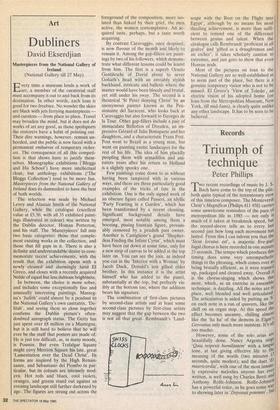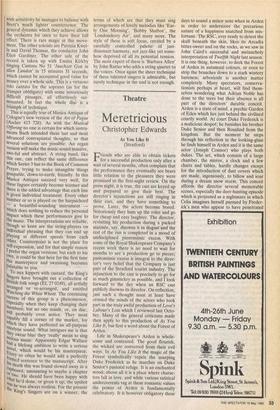Records
Triumph of technique
Peter Phillips
Two recent recordings of music by J. S. Bach have come to the top of the pile, both quite typical of the tercentenary view of this timeless composer. The Monteverdi Choir's Magnificat (Philips 411 458) carries some unwelcome reminders of the pace of metropolitan life in 1985 — not only is much of it taken at breakneck speed, but the record-sleeve tells us to every last second just how long each movement has lasted. From this I can inform you that the `Sicut locutus est', a majestic five-part fugal chorus is here recorded in one minute 23 seconds. The tempo which produces this timing does some very unsympathetic things to the phrasing, which comes over as being brutally efficient, as it were trussed up, packaged and cleared away. Overall it is the chorus-singing which shows this most, which, as an exercise in ensemble technique, is dazzling. All the notes are in place, well blended and well articulated; The articulation is aided by putting an 'II on each note in a run of quavers, like the chiff on an organ stop. At this speed the effect becomes uncanny, chilling almost like the 'ha ha' of the demons in Elgar s Gerontius only much more insistent, It's au too macho.
However, some of the solo arias are beautifully done. Nancy Argenta sii185, `Quia respexit humilitatem' with a limpid tone, at last giving effective life to tlle, meaning of the words (two minutes 1) seconds, quite modest); and the duet `E( misericordia', with one of the most innate- ly expressive melodies anyone has ever written, is well sung by Charles Brett ad' Anthony Rolfe-Johnson. Rolfe-Johnsen has a powerful voice, as he goes some way t to showing later in Teposuit potentes' '1711 with sensitivity he manages to balance with Brett's much lighter countertenor. The general dynamic which they achieve allows the orchestra for once to have their full effect. There is rare magic in this move- ment. The other soloists are Patrizia Kwel- la and David Thomas, the conductor John Eliot Gardiner. The other side of the record is taken up with Emma Kirkby singing Cantata No 51 'Jauchzet Gott in alien Landen' in 15 minutes 31 seconds, which cannot be accounted good value for money over a whole side. This is a virtuoso solo cantata for the soprano (as for the trumpet obbligato) with some notoriously difficult passages, all effortlessly sur- mounted. In fact the whole disc is a triumph of technique.
This is equally true of Musica Antigua of Cologne's new version of the Art of Fugue (Archiv 413 728). As with the Musical Offering no one is certain for which instru- ments Bach intended these last and most advanced contrapuntal thoughts, so that Several solutions are possible. An organ version will make the music sound massive, awe-ful and abstract. A string band, like this one, can reflect the same difference Which Series 3 has to the Book of Common Prayer, trying to make intangible things graspable, down-to-earth, friendly. In this Musica Antigua succeed very well, for these fugues certainly become warmer and there is the added advantage that each line is given individual treatment. Every other number or so is played on the harpsichord a beautiful-sounding instrument Which does nothing to reduce the personal impact which these performances give to the music. The interpretations are reliable, though so keen are the string-players on individual phrasing that they can end up Playing at different speeds from each other. Counterpoint is not the place for self-expression, and for that simple reason ' Prefer the organ versions; but each to his °Nvn, it could be that here for the first time this masterpiece and swansong becomes Palatable to you. To mix kippers with custard, the King's Singers have brought out a collection of British folk songs (EL 27 0249), all artfully arranged or re-arranged, and entitled Watching the White Wheat. The continuing success of this group is a phenomenon, especially when they keep changing their members; but no one minds, or, on disc,
Will probably even notice. They most eaPably fill a corner of the market, for Which they have perfected an all-purpose they sound. What intrigues me is that 'ey swear blue they 'really' mean to sing
serious music. Apparently Edgar Wallace had a lifelong ambition to write a serious novel, which would be his masterpiece. fryer), so often he would add a perfectly ,s'.rined sentence to the manuscript. After _"is death this was found stowed away in a coupboard, amounting to maybe a chapter wt.:ft. He should have been happy with was he'd done, or given it up, the upshot
the he was always restless. For the present King's Singers are on a winner, the terms of which are that they must sing arrangements of lovely melodies like 'Ear- ly One Morning', 'Bobby Shaftoe', the 'Londonderry Air', and many more. The style of these is soft focus, created by a carefully controlled palette of just- dissonant harmony, not jazz-like yet some- how deprived of all its potential tension. The most expert of these is 'Barbara Allen' by John Rutter who adds a string quartet to the voices. Once again the sheer technique of these talented singers is admirable, but surely technique in the end is not enough.















































 Previous page
Previous page